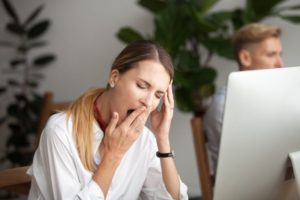
Sleep apnea is a common disorder that involves pauses in breathing while resting, leading to difficulty getting shut eye. Loud snoring is an easy way to know if you’re affected by sleep apnea, but what if you sleep alone? Is there any way you can tell if you have this disorder? Thankfully, your dentist has put together a list of the typical warning signs of sleep apnea. Keep reading to get a better idea of what’s going on while you’re trying to get some rest!
Common Signs & Symptoms
It’s no secret that sleep apnea can be hard to detect with an estimate of around 80% of cases in the US undiagnosed. However, you and your sleeping partner can be on the lookout for these common warning signs so you can get back to the rest you deserve:
- Loud snoring
- Waking up gasping for breath
- Waking up with a bad taste in your mouth
- Waking up with a headache or sore throat
- Getting up multiple times during the night
- Mood swings
- Daytime drowsiness
- Waking up with a choking sensation
- Lack of interest in sex
Are You at Risk?
In addition to knowing the warning signs, it’s also important to understand your risk for this problem. If any of these risks sound familiar, you should be aware that you can suffer from sleep apnea even if symptoms aren’t severe. These factors include:
- Large neck circumference
- Obesity
- Male gender
- Family history of sleep apnea
- Being over the age of 40
- Small lower jaw
- Hypertension
Do You Think You Have Sleep Apnea? Here’s What Comes Next
If you notice any of these symptoms, please don’t hesitate to contact your dentist right away. They may recommend that you participate in a sleep study. You’ll spend the night at a high-tech lab while experts monitor your breathing while sleeping. Sometimes, you can even participate in a sleep study in the comfort of your own home.
Once your sleep apnea has been diagnosed, you can visit your dentist for treatment. They will create a personalized oral appliance, which positions your jaw and/or tongue in a way that promotes a clear airway. This leads to easier breathing, allowing you to count sheep with ease. Traditionally, CPAP machines have been used to treat sleep apnea, but these are bulky and sometimes irritating. However, oral appliances offer a more comfortable, convenient, and easy to use option for patients with sleep apnea.
Now that you know more about the common signs of sleep apnea, stay aware of your sleeping schedule and contact your dentist if you notice any warning signs!
Meet the Dentist
Dr. Mitch Conditt is an experienced dentist who has been diagnosed with sleep apnea himself, which is why he is passionate about helping patients enjoy better sleep. He offers the latest treatments and technology to improve your health and life. For any questions, he can be reached through his website at Fort Worth Snoring & Sleep Center or by phone at (817) 527-8500.
